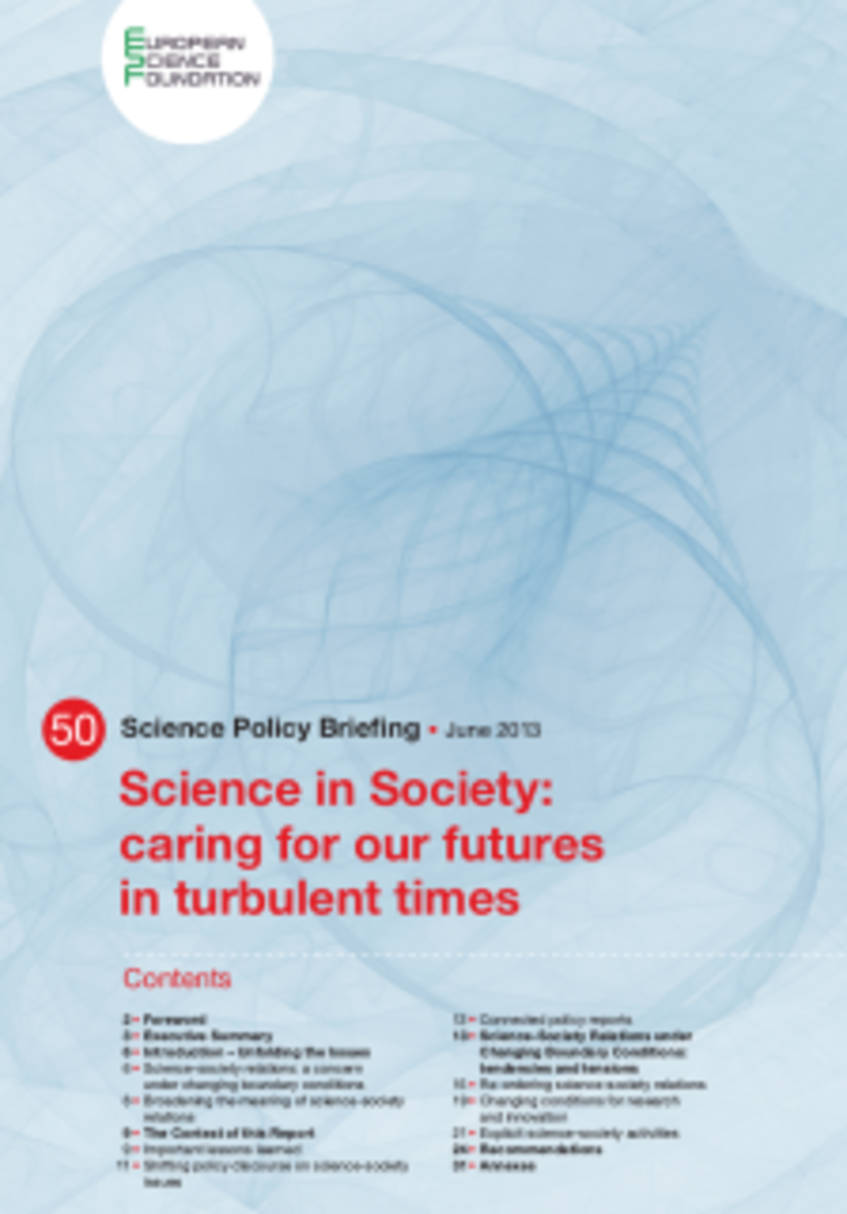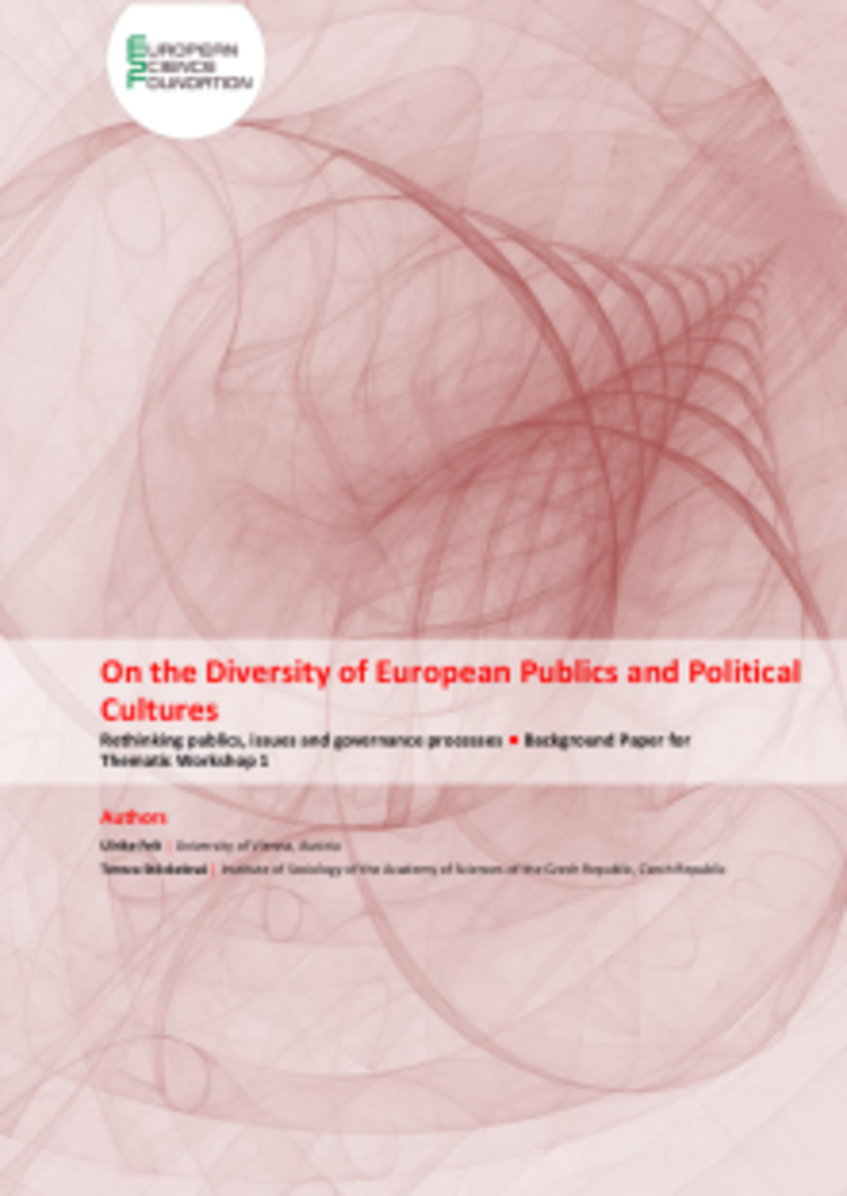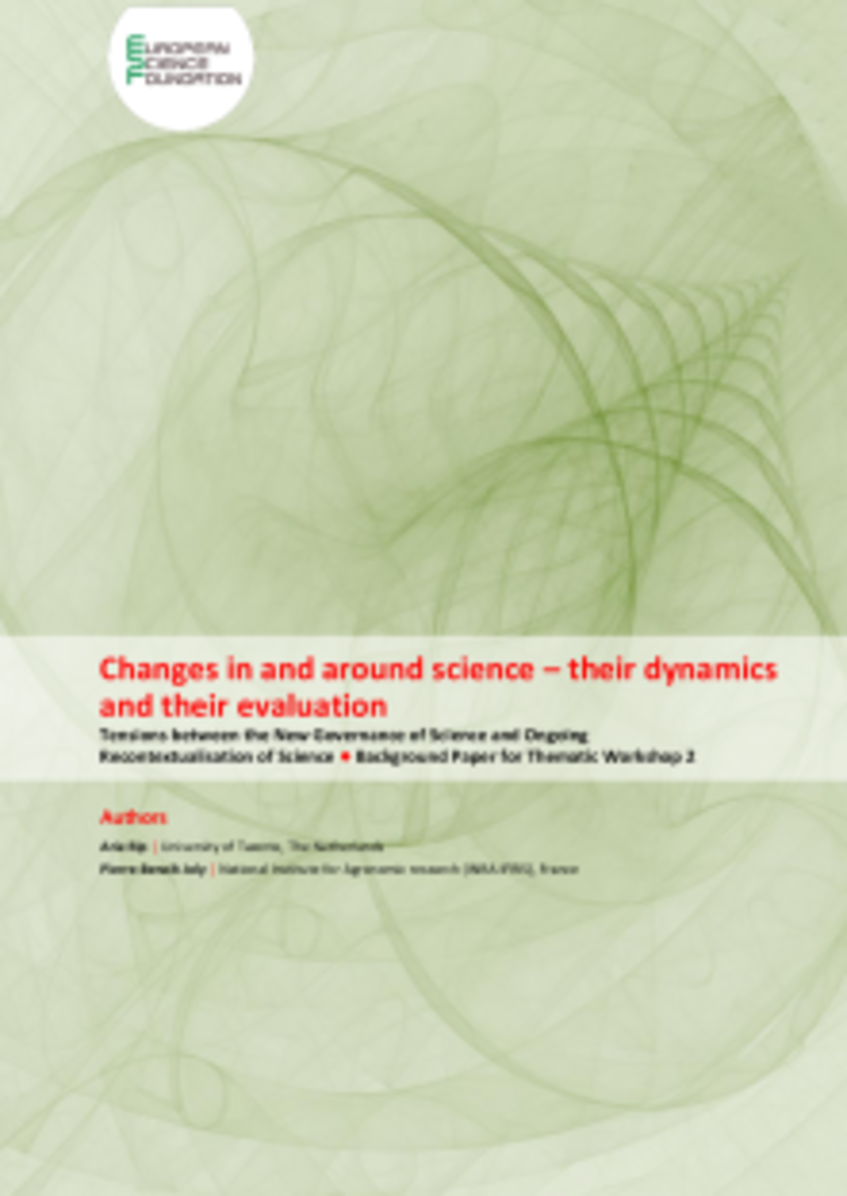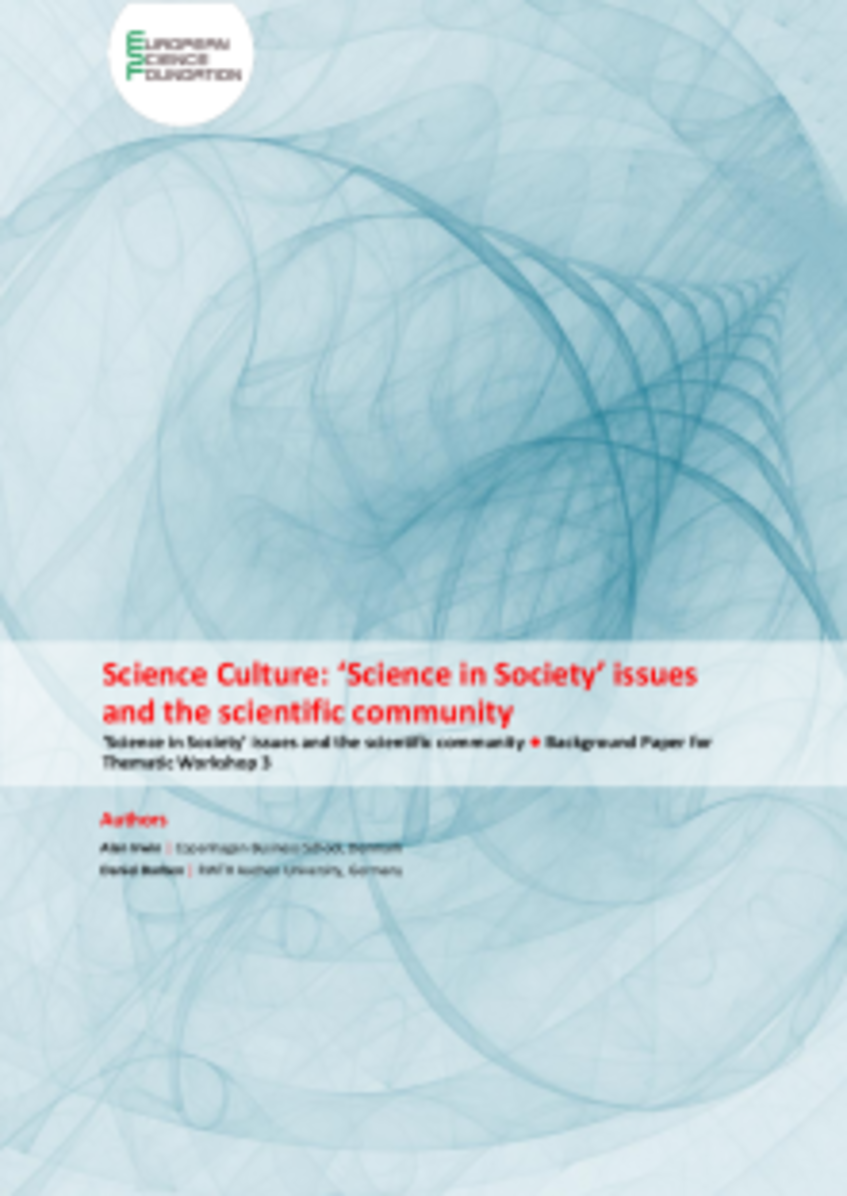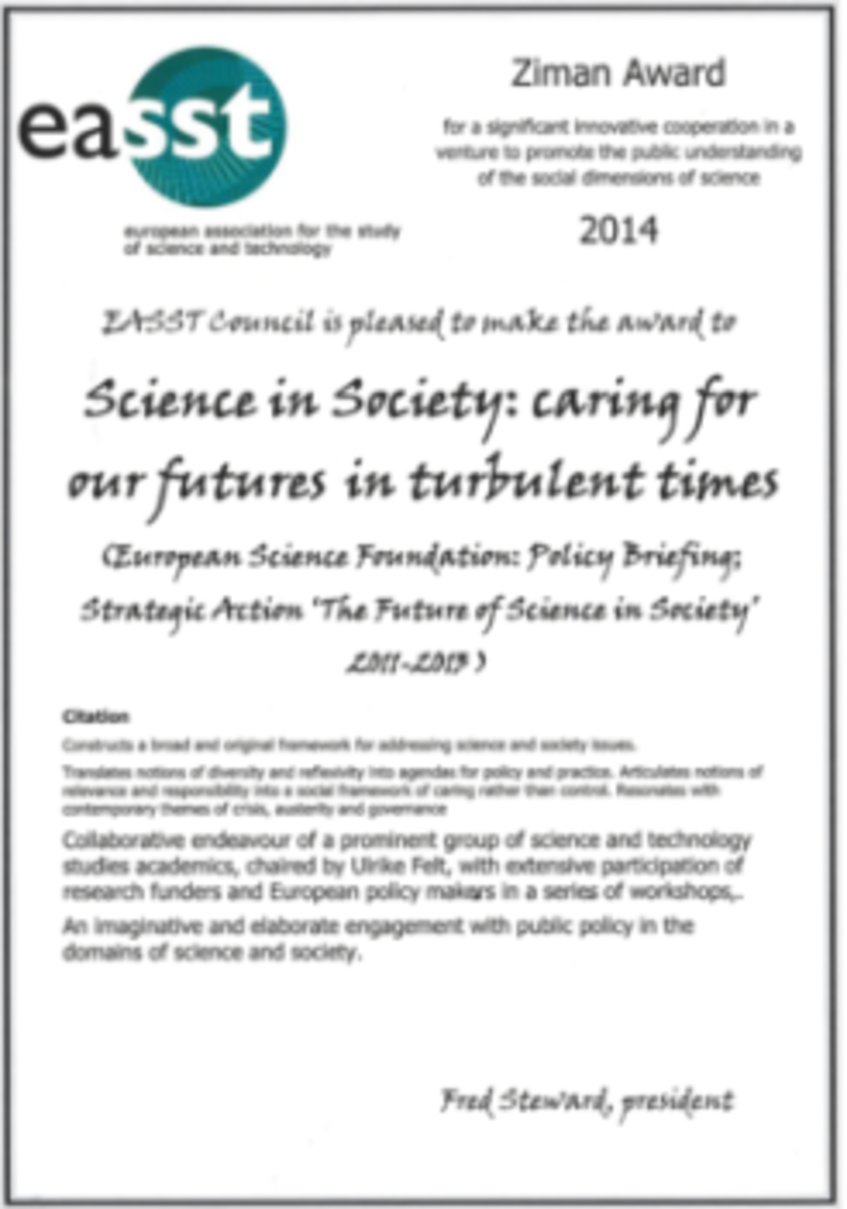Science in Society - caring for our futures in turbulent times
The Science Policy Briefing 'Science in Society: Caring for our futures in turbulent times' is the outcome of a broad discussion process funded by the European Science Foundation (ESF), addressing the more recent key-challenges raised by the ever-closer entwinement of technoscientific and societal developments. While addressing these issues is in itsself by no ways new, this report is written at a time of two novel, closely related, challenges. First, science and technology are increasingly governed at multiple sites, by diverse actors and in disparate ways. Second, the sense of austerity and crisis across Europe has important consequences for the governance of science and technology. This all happens at a time when innovation is being promoted more vigorously than ever as a way out of crisis and as a foundation for future prosperity.
The titel of the report captures two core messages. The notion of "turbulent times" points at the fact that the novel challenge lies in the fact that rapid and continuous change always come with turbulences and that societies thus need to learn how to live with, accompany and govern such sociotechnical change processes. This goes hand in hand with the notion of "caring for our futures". It highlights the need for a stronger process orientation – expressed in the notion of care – when thinking about our engagement with technoscietific and societal change; for stretching our attention to the whole knowledge generation process from education, over lives in research to more concrete innovation processes; for a close consideration of diversity of values to be considered; and for more attention to the direction of innovation and not solely to the speed and frequency in which it occurs.
Professor Ulrike Felt was Chair of the Scientific Committe writing this report. It constisted of six other expert members from the field of Science and Technology Studies:
- Professor Daniel Barben, University of Klagenfurt, Austria
- Professor Alan Irwin, Copenhagen Business School, Denmark
- Dr. Pierre-Benoît Joly, National Institute for Agricultural Research (INRA), France
- Professor Arie Rip, University of Twente, Netherlands
- Professor Andrew Stirling, University of Sussex, United Kingdom
- Dr. Tereza Stöckelová, Institute of Sociology, Academy of Sciences, Czech Republic
Short CVs can be found here.
The report was launched at the Lithuanian EU Presidency conference 'Horizons for Social Sciences and Humanities' in Vilnius on 23-24 September 2013 with Professor Helga Nowotny (President of the ERC) and Professor Paul Boyle (President of Science Europe) as main speakers:
Why writing this report now?
The report constructs a broad and original framework for addressing science and society issues, while translating notions of diversity and reflexivity into agendas for policy and practice. Furthermore, it articulates notions of relevance and responsibility into a social framework of caring rather than control and resonates with contemporary themes of crisis, austerity and governance.
Talking about the considerations that have gone into the report and the role such Policy Reports can play:
"This report is not to be considered as the end of an engagement process, but is much rather the starting point, with the team of co-authors carrying these reflections into our respective countries, different relevant setting but also international venues."
- Ulrike Felt
Feedback from audience and participants:
"The report does a marvelous job in articulating the everyday life we have as researchers with the needs on the political level." Johannes Angermüller (ERC Grantee)
"It's just at the right time for the arrival of the report to influence Horizon 2020. The features I like best concern the issue of diversity in Europe and the need to create new spaces of innovation." Fred Steward (President of the European Association for the Study of Science and Technology, EASST)
Positions from European scholars:
"Tacitly there is a plea for honesty and integrity both of policy makers and scholars [...]"
- Björn Wittrock
Opinions from US colleagues:
"One innovation of the report is how you deal with values in conflict and tension [...]"
- Edward Hackett
Background Reports
Three thematic workshops prepared the road for a fruitful discussion & the final report.
- On the Diversity of European Publics and Political Cultures
- Changes in and around science: their dynamics and their evaluation
- Science in Society issues and the scientific community
For further information please click on the reports below:
Award winning report
The authors of the report won this year's Ziman Award 2014 for significant innovative cooperation in a venture to promote the public understanding of the social dimensions of science by the European Association for the study of science and technology (EASST)
"Collaborative endeavour of a prominent group of science and technology studies academics, chaired by Ulrike Felt, with extensive pafticipation of research funders and European policy makers in a series of workshops. An imaginative and elaborate engagement with public policy in the domains of science and society."
(Fred Steward, EASST President)

